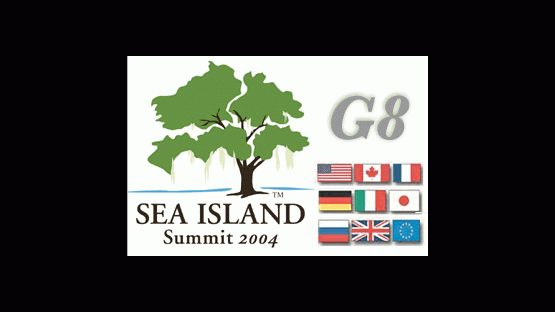Leaders of the Group of 8 leading industrialized countries (G8) have announced an action plan on non-proliferation that calls for measures to further increase the effectiveness of the IAEA in fields of nuclear non-proliferation and radioactive waste management. The announcement was released 9 June at the 2004 G8 Summit in Sea Island, Georgia. G8 countries include Canada, France, Germany, Italy, Japan, the Russian Federation, United Kingdom, and the United States. The European Union also participates in the summit, which takes place annually.
The G8 action plan on non-proliferation outlines measures and activities designed to reduce the risk of nuclear weapons proliferation and the acquisition of nuclear materials and technology by terrorists, while allowing the world to enjoy the benefits of the peaceful uses of nuclear energy. Towards this end the G8 leaders endorsed, among others, a one-year freeze on inaugurating any new initiatives to transfer enrichment and reprocessing technology to additional states, and set the next G8 summit in the United Kingdom as a target for when appropriate measures can be put into place.
In the plan, G8 leaders call for universal adherence to IAEA comprehensive safeguards and the Additional Protocol and urge all states to ratify and implement these agreements promptly.
"We are actively engaged in outreach efforts toward this goal, and ready to offer necessary support. The Additional Protocol must become an essential new standard in the field of nuclear supply arrangements. We will work to strengthen NSG guidelines accordingly. We aim to achieve this by the end of 2005."
The G8 action plan also calls for measure to further increase the effectiveness of the IAEA:
"To enhance the IAEA's integrity and effectiveness, and strengthen its ability to ensure that nations comply with their NPT obligations and safeguards agreements, we will work together to establish a new Special Committee of the IAEA Board of Governors. This committee would be responsible for preparing a comprehensive plan for strengthened safeguards and verification. We believe this committee should be made up of member states in compliance with their NPT and IAEA commitments."
On the issue of security of radioactive sources, the G8 leaders urged all states to implement the revised Code of Conduct on the Safety and Security of Radioactive Sources which the IAEA approved in September 2003. States should recognize the Code as a global standard, they said, adding that they "have agreed to export and import control guidance for high-risk radioactive sources, which should only be supplied to authorized end-users in states that can control them. States should ensure that no sources are diverted for illicit use."
In the action plan, G8 leaders expressed support for the IAEA´s programme for assistance to ensure that all countries can meet the new standards.
The full text of the G8 Action Plan on Non-proliferation is available from the G8 Sea Island Summit official site.


